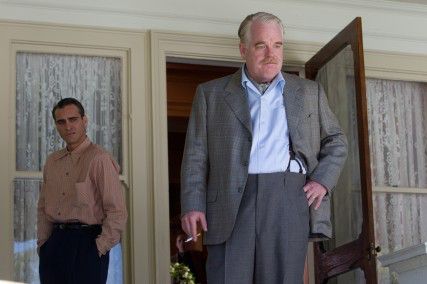This is the film I’ve been waiting for. Paul Thomas Anderson is one of the most humane directors to grace the silver screen, and the emotional power of his film is unrivaled. He tackles human conflicts that most wouldn’t touch. He succeeds in portraying potentially melodramatic material due to the authentic performances he fosters in the actors. They often reach the pinnacle of their expressive power. The Master contains the same poignant, arresting performances you would expect from the mature director and carries forth the elegant shooting style of There Will Be Blood (2007) with fresh, arresting images of naval life and ‘50s bourgeois society. One senses a more calculated, sure-sighted Anderson behind this 70mm masterpiece. The film revolves around Freddie Quell (Joaquin Phoenix), who has come home from World War II and is re-adjusting to civilian life. He stumbles upon an intriguing religious leader, Lancaster Dodd (Philip Seymour Hoffman). Soon, Freddie is Dodd’s indifferent apostle — he joins the ranks of the Cause (the religious movement that Dodd preaches around America) by making Dodd potent drinks that contain paint thinner. The rest of the movie has Freddie converted to the Cause and subsequently questioning its legitimacy.
Hoffman is delightfully explosive; Phoenix is monstrous one moment and evokes piteous tears in another. Dodd’s wife (Amy Adams) is unsettling and fanatical to her husband’s ideology. In a bizarre bathroom scene, she asserts authority over her husband, rendering him helpless, both sexually and verbally. Her character is a troubling piece to the puzzle that is The Master.

The reception at Coolidge Corner on Sunday, from what I witnessed, wasn’t ecstatic, nor was it outright contemptuous. Some felt the film left something to be desired; others sensed the deft control of true masters at work — namely, Anderson, Hoffman, Phoenix and the film’s composer, Jonny Greenwood. When artists of diverse crafts, each with their own distinctive voice, collaborate on a project, the results are irresistibly delightful. A movie audience deserves performances, music and images such as these.
Always able to keep us enthralled in that regard, Anderson now asks us to explore our deepest human condition. He does this through Freddie, who some critics have seen as a misplaced protagonist, believing Dodd to be the proper focus. They fail to realize that Freddie is a man who begins the movie as the un-mastered man, an animal. He is the Dionysian, the too-much-ness of life. He sees sex in every Rorschach test, he imagines women without clothes as they dance before him and he drinks anything that will get him drunk. Most of all, he loves unconditionally and without pretense. Anderson reminds us that he is human and enslaved by these impulses. The rest of the film is devoted to exploring what controls can be imposed on a man with such a voracity for life — can Freddie be tamed and civilized?
And what better way to adequately reset the civilized man than a grueling war? This film is not about a post-WWII nation reeling to recover and the maimed generation it produced. Instead, The Master strips away our humanity and arrives at its essence by asking the question, “Who is the final master over our being?” Through Dodd, the film exposes the ways in which we try to control our reality and our selves. This is best summed up by Dodd’s early line, “I am a scientist, a connoisseur … a writer, a doctor, a nuclear physicist, a theoretical philosopher but, above all else, a hopelessly inquisitive man.” Dodd is the pinnacle of Rationalizing Man, the Apollonian man. Indeed, he has tried to free himself from his reality through his theories, religions and questions — all to find meaning. But who is the ultimate master, even over Dodd?
Anderson’s ultimate proclamation of a final master is not one he shouts — his film is after the sublime. And if one views it while ignoring the surrounding hype and pretenses, he or she will discern just how thoroughly the film explores our susceptibility to be overcome by whomever and whatever provides us with love and understanding. No one, not even Freddie, can remain a sailor, free at sea, viewing the ship’s wake from the safety of the stern.
This is an account occasionally used by the Daily Free Press editors to post archived posts from previous iterations of the site or otherwise for special circumstance publications. See authorship info on the byline at the top of the page.



